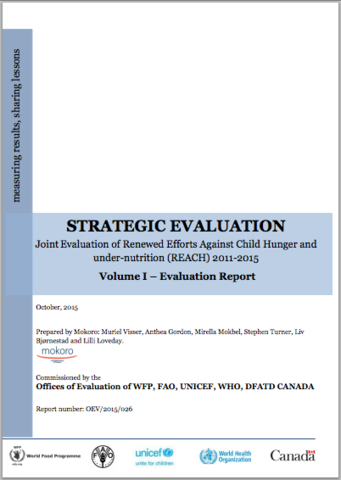
The evaluation found that the design of REACH fitted well with the priorities of the international nutrition agenda and of partner agencies, including gender and equity objectives. At the country level, it has complemented the work of the Scaling Up Nutrition movement. However, its theory of change underestimated the importance of the level of political commitment from governments, the political economy of the United Nations, the importance of accountability, and incentives for support to the initiative within the United Nations.
The timeframes of REACH were overambitious. REACH has made substantial progress in contributing to increased awareness and commitment; and strengthening national nutrition policies and programmes. Less has been achieved with regard to capacity development, and increasing effectiveness and accountability. REACH's tools and analytical work highlighted equity and gender issues. Results were achieved at lower costs than budgeted, allowing timelines to be extended. Results are unlikely to be sustainable.
Noting that far-reaching decisions concerning REACH have recently been made with REACH becoming the coordinating body for the United Nations Network for Scaling Up Nutrition, the evaluation's recommendations centre on: i) maintaining the initiative's focus as a neutral facilitator of nutrition governance at the country level; ii) expanding timeframes for engagement; iii) strengthening incentive structures within the United Nations to contribute to the initiative; iv) redesigning the theory of change; v) improving alignment with other technical support in nutrition; and vi) strengthening support for issues related to gender and equity.
